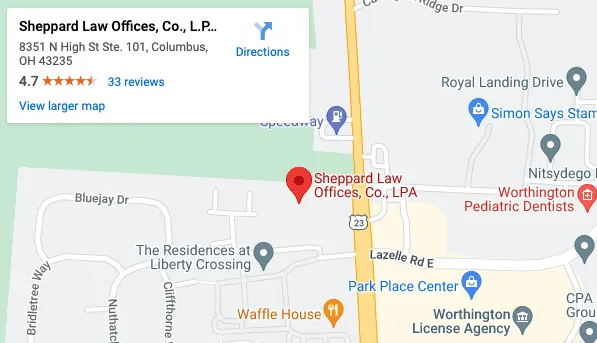Protecting Inheritance in an Ohio Divorce
When dealing with divorce issues in Ohio, one crucial question that often arises is: “How does divorce affect inheritance?” It’s essential to be aware of the laws and regulations surrounding divorce and inheritance in Ohio to protect your assets, ensure a fair division, and make informed decisions during the divorce process.
Navigating the complexities of both divorce and inheritance laws can be a daunting task, which is why working with our Ohio family law attorneys is highly recommended. At Sheppard Law Offices, we understand the unique challenges individuals face during these circumstances and we are here to provide the legal assistance you need.
Whether you require assistance in drafting prenuptial or postnuptial agreements to protect your assets, guidance in understanding the impact of divorce on wills and trusts, or support in navigating property division and its effect on inheritance, we are here to guide you every step of the way. Contact us today to schedule a free consultation and take the first step towards securing your rights and ensuring a smooth transition during this challenging time.
Understanding the Legal Aspects and Implications of a Divorce
Divorce is a legal process that dissolves a marriage, officially terminating the marital relationship between two individuals. When a couple decides to pursue a divorce, they are seeking to legally sever the bonds of marriage and live separate lives. It is designed to end the legal and financial obligations between spouses. It provides a framework for the division of assets, determination of child custody, and settlement of other related matters.
Divorce can be initiated by one spouse, known as the petitioner or plaintiff, or it can be a mutual decision between both spouses. Divorce proceedings vary by jurisdiction, but they typically involve a series of requirements and considerations. It is highly recommended to consult with a Columbus divorce attorney familiar with the laws of the specific jurisdiction in which the divorce is being pursued.
Understanding Inheritance in Columbus, Ohio
Inheritance refers to the transfer of property, assets, rights, and obligations from one person to another upon the death of the former. It is a legal process by which the possessions and wealth of a deceased person, known as the decedent, are distributed among their beneficiaries or heirs according to the laws of inheritance or the decedent’s last will and testament.
When a person passes away, their estate, which includes all their property, financial accounts, investments, real estate, and personal belongings, becomes subject to the laws and regulations governing inheritance. It’s important to note that these laws and regulations can vary from one jurisdiction to another, including in Columbus, Ohio.
To navigate the complexities of inheritance laws and ensure a smooth transfer of assets according to your loved one’s wishes, it’s advisable to seek legal guidance from our experienced family law attorney in Columbus. At our law firm, Sheppard Law Offices, we have a deep understanding of the laws and procedures governing inheritance. Our goal is to help you with the correct handling of the transfer and management of assets, providing peace of mind during this challenging time.
Contact us today to schedule a consultation, and let us guide you through the process of protecting your loved one’s legacy and securing your family’s future.
How Does Divorce Affect Inheritance in Ohio?
Divorce can have significant implications on inheritance rights. Our Columbus inheritance and divorce lawyer can help you understand how divorce affects inheritance. Here are several key impacts to consider:
Division of Marital Property
State laws govern how property is divided during divorce. In Ohio, the court follows the principle of equitable distribution, meaning assets acquired during the marriage are divided fairly, though not necessarily equally. This division may include inherited assets if they’ve been commingled with marital property or used for the benefit of the marriage.
Treatment of Separate Property
In Ohio, inherited assets are generally considered separate property and not subject to division during divorce. If an asset was received by one spouse through inheritance before or during the marriage and has been kept separate from marital assets, it typically remains the sole property of the inheriting spouse. However, if inherited assets have been mixed with marital property or contributed to jointly owned assets, they may be subject to division.
Impact on Intestate Succession
In the event a spouse passes away during an ongoing divorce, the divorce case will be dismissed, leaving the surviving spouse as a widow or widower.
Assets and Property:
- Assets designated for transfer to beneficiaries upon death will proceed as intended.
- If a valid will exists, the Probate Court reviews it, and asset distribution aligns with the deceased’s wishes.
- Without a will, the surviving spouse usually inherits the estate.
Debts:
- Joint debts continue to be the responsibility of the surviving spouse.
- Debts solely under the deceased spouse’s name become the estate’s responsibility, subject to creditor claims.
For proper guidance in this kind of situation, consult our experienced family law and estate planning attorney to understand the necessary actions for protecting your interests.
What are the Factors Considered in Dividing Property in Ohio?
In Ohio, the court begins with the presumption of equal division when it comes to dividing marital property during a divorce. However, to ensure an equitable distribution, the court carefully evaluates all the assets and liabilities of the spouses.
When determining the division of property, the court considers several factors to ensure a just and reasonable outcome. Our Columbus OH inheritance and divorce attorney can help you understand the following key factors considered in dividing property in Ohio:
- Each spouse’s assets and liabilities: The court assesses the financial standing of each spouse, including their individual assets and debts.
- The duration of the marriage: The length of the marriage is taken into account as it can impact the financial contributions of each spouse during the relationship.
- The costs of selling the property: If certain assets need to be sold to achieve a fair division, the associated costs are considered.
- Custodial parent’s benefit: If there are children involved, the court considers whether the custodial parent would benefit from retaining the marital home.
- Tax consequences: The potential tax implications of property division for each spouse are carefully evaluated.
- Liquidity of the property: The court looks into the ease of converting assets into cash without significant loss in value.
- Retirement benefits: The retirement benefits of each spouse are taken into consideration as part of the overall financial picture.
- Premarital agreement: If the couple executed a premarital agreement concerning property division, its terms will be considered.
How Can I Protect My Inheritance from My Spouse in Divorce?
Protecting your inheritance from your spouse in a divorce requires proactive steps and careful planning. Here are some strategies to protect your inheritance:
- Prenuptial Agreement: Consider entering into a prenuptial agreement before marriage. This legally binding contract can outline the treatment of assets, including inheritances, in the event of divorce, providing clarity and protection.
- Postnuptial Agreement: If you didn’t sign a prenup before marriage, a postnuptial agreement can be established during the marriage to address asset division, including inheritances, in case of divorce.
- Keep Inheritance Separate: To maintain your inheritance as separate property, avoid commingling it with joint assets. Keep inheritance funds in a separate account and avoid using them for marital expenses.
- Documentation: Maintain clear records of your inheritance, such as wills, trust documents, or any transfer of assets. Proper documentation can help prove the inheritance’s separate nature.
- Avoid Joint Ownership: Refrain from adding your spouse’s name to inherited properties or assets, as joint ownership could make them subject to division during divorce.
- Gifts and Loans: Be cautious when gifting or loaning your inheritance to your spouse, as this could potentially impact its status as separate property.
- Estate Planning Updates: Regularly update your estate planning documents, specifying the intent to preserve your inheritance as separate property.
- Seek Legal Advice: Consult with our experienced family law and estate planning attorney. They can guide you through the legal complexities and tailor a strategy to protect your inheritance.
- Full Disclosure: Be transparent about your inheritance during the divorce process. Full disclosure is essential for maintaining the integrity of any prenuptial or postnuptial agreements.
Remember that laws and regulations regarding inheritance in divorce can vary by jurisdiction. Seeking legal advice from an experienced attorney will ensure that your inheritance is protected and your rights are preserved during this challenging time. Contact us today to schedule a free consultation.
Why Do I Need an Inheritance and Divorce Attorney in Ohio?
Dealing with both inheritance and divorce simultaneously can be an overwhelming and challenging process. Working with our Columbus inheritance and divorce attorneys at Sheppard Law Offices is crucial to navigating the complexities of these situations. Here are several reasons why you need us:
- Protecting Your Inheritance Rights: We will protect your inheritance rights and help ensure that your inherited assets are properly identified and accounted for during the division of property.
- Understanding Complex Legal Issues: We have in-depth knowledge of Ohio family laws and we help you understand the legal implications, rights, and obligations associated with inheritance and divorce.
- Mitigating Potential Disputes: We will work to mitigate potential disputes, negotiate settlements, or, if necessary, advocate for you in court to achieve a favorable resolution.
Call Our Columbus Inheritance and Divorce Attorney Now!
Dealing with divorce and inheritance matters in Ohio can be overwhelming, emotional, and complex. From divorce and child custody disputes to adoption and property division, it would be wise to seek legal advice from our Columbus inheritance and divorce attorneys at Sheppard Law Offices.
How does divorce affect inheritance? By working with our family law firm, we will help you develop a customized legal strategy tailored to your unique circumstances, taking into consideration how divorce may impact your inheritance rights. We will handle all the necessary paperwork and court procedures, ensuring that your case is handled correctly and efficiently.
Our goal is to achieve the best possible outcome for you and your family. Contact us now to schedule a free consultation. Let us listen to your concerns, evaluate your case, and provide you with a clear roadmap forward. We will be with you every step of the way, understanding the emotional toll these matters can take on you and your loved ones.
We also provide Columbus, Ohio residents the following legal services:


